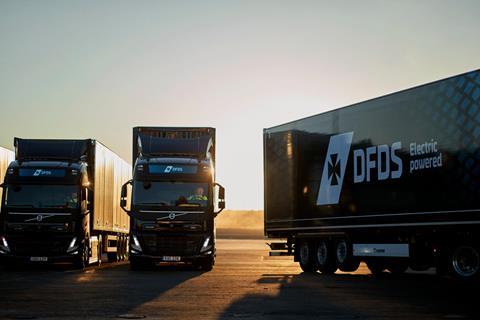DFDS said it would become one of the biggest operators of electric heavy duty trucks in the UK with the introduction of 10 Volvo FM and FH electric models in east and northwest England and Ireland.
The ferry and logistics company already runs the largest fleet of e-HGVs in Europe and it now has its sights set on the UK
Allan Bell, VP and head of DFDS Logistics in the UK & Ireland, said: “DFDS wants to drive the transition to low-emission road transport.
“We are pleased to be deploying electric trucks in the UK, which will enable us to support more companies that want to decarbonise their supply chains.
“There are still challenges ahead and we need to work together across sectors to be successful, for example in setting up charging infrastructure, but DFDS is committed to do whatever we can to push the development forward.”
DFDS currently operates 115 electric trucks in Sweden, Denmark, Lithuania, the Netherlands, Belgium and Germany, with 110 more on the way.
It said that so far this year, the fleet had covered more than 1.2m miles and achieved CO2e emissions savings of 2,112 tonnes.
“We already have extensive experience operating electric trucks on several European markets, and we will use that experience in the UK,” said Bell.
“The interest from UK companies in more sustainable road transport solutions is substantial, and we have ambitions to scale up our low-emission transport offerings in the future.
“And with electric trucks operating across our extensive network, we can help lower the emissions for customers not only in the UK but on freight across Europe.”

DFDS is a partner in the zero emission northern (ZEN) freight consortium, which aims to accelerate the decarbonisation of HGVs in the UK.
The consortium plans to establish a network of hydrogen refuelling and electric charging stations.
DFDS has a group wide target to have at least 25% of its truck fleet electrified by 2030.














![Maritime_Terminal[73510]](https://d2cohhpa0jt4tw.cloudfront.net/Pictures/100x67/7/0/1/17701_maritime_terminal73510_883926.jpg)